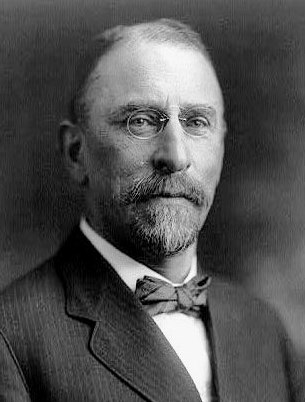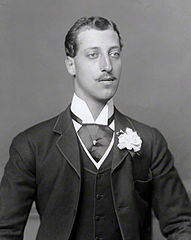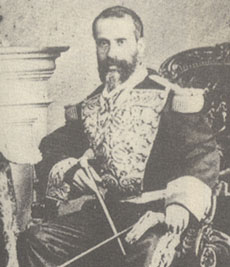Profile: Henry Morgenthau Sr.
Excellent articles Zoidberg12! Consider them canon. I hope to see more from you soon. Cheers!
Thanks! Heres another one.
Henry Morgenthau Sr. (1856-1948)

Henry Morgenthau Sr. was born on April 26, 1856 to an Ashkenazi Jewish family in the town of Mannheim in the Grand Duchy of Baden. His family emigrated to the United States of America in 1866, when Henry was only ten years-old. Morgenthau attended City College of New York from 1874 until 1877 when the twenty-one year-old student was drafted into the United States Army and sent to an army training camp in Tampa, Florida. Morgenthau served in the 7th U.S. Infantry Regiment as a part of 1st Brigade under Brigadier-General James Longstreet and took part in the seaborne invasion of Cuba. At one point during the Siege of Santiago de Cuba in March of 1878, Morgenthau was shot in the hip by a Spanish infantryman and was sent to a nearby US Army hospital. It was here that Morgenthau was treated for his hip wound, as well as for malaria that he caught while in the interior of Cuba. He would have died had it not been for the quick action of the US Army doctors, as well as for the quick action of Spanish and Cuban doctors who defected to the US and had knowledge of tropical diseases. He was later invalidated home to New York City in June of 1878 and resumed his studies at City College of New York from late 1878 to 1879. He attended Columbia Law School from 1879 to 1883.
In September of 1883, soon after he finished law school, Morgenthau set up a small law-firm in New York City and began investing in real-estate in New York state and New Jersey and also began investing in railroads and the stock-market. On Saturday, October 4, 1884, he married his wife Josephine Sykes (1863-1952). The couple would have six children; Elizabeth (August 9, 1885-September 1, 1978), Martha (September 3, 1887-January 6, 1960), Herbert (October 9, 1891-June 9, 1964), Solomon (February 15, 1894-June 2, 1996), Henry Jr. (December 29, 1895-June 22, 1963) and Benjamin (June 8, 1900-July 30, 1978).
Throughout the 1880s and 1890s, Morgenthau gained a reputation as a successful and well-respected lawyer and a prominent leader of the Reform Jewish community of New York City. In his spare time, Morgenthau began reading up on foreign policy and global affairs, this being knowledge which would serve him well later in life. In 1894, Morgenthau successfully ran for a seat in the New York Senate under the banner of the Republican Party. In 1900, Morgenthau ran for Governor of New York and, in spite the rather large amount of antisemitism that accompanied the campaign, defeated his 37 year-old Democratic opponent William Curtis Hennessy. Morgenthau served as Governor of New York from January 1, 1901 to December 31, 1909, and he proved to be a popular and effective governor. When the United States entered the Great War in 1909, he actively toured New York state and attended numerous recruitment rallies in support of the war effort. This was very personal to him, as his two daughters were severing as nurses and his son Herbert was serving in the infantry, all in Europe and against the Second French Empire. It was at one of these rallies, at Buffalo, New York on October 16, 1909, that Morgenthau meet President Robert Todd Lincoln for the first time. The two men got along quite well and discussed a wide array of things in regards to the war. After his term as governor ended on December 31, 1909, Morgenthau continued to serve in the New York senate and continued to be active in his support of the war effort and attended many rallies.
After the signing of the Treaty of Brussels on October 12, 1911, Morgenthau was appointed by President Lincoln to be the first American ambassador to the new French Republic under President Marcel Ames. Morgenthau served well in this capacity and got along well with President Ames, calling him "the man France both needs and deserves at this moment in history to rebuild from the ruins of its autocratic and chauvinist past." On June 24, 1915, Morgenthau survived an assassination attempt outside of the American embassy in Paris by Ferdinand Pierre Camus, a twenty-seven year-old veteran of the Great War and a die-hard Bonapartist. Morgenthau was shot in the chest but was saved thanks to a watch that he kept in his pocket. Camus was executed by guillotine by the French government on August 1, 1915. Whether or not antisemitism ever played a part in the assassination attempt has never been conclusively proven. Morgenthau served as Ambassador to France until 1916 when he was recalled to Washington D.C by President Roosevelt.
In 1917, Morgenthau was appointed by President Roosevelt to be ambassador to the Kingdom of Bohemia. Since Morgenthau could speak fluent German, the job was somewhat easier that it would have been otherwise, although he had to learn the Czech language, a language that he found "somewhat difficult to learn." He served in this capacity until 1921, when he was appointed by President Doner to be the ambassador to Hungary. He served in this capacity until 1925 when he was politely dismissed by the Democratic President Abercrombie. Morgenthau then returned to New York City, bought a small brownstone apartment with the help of his sons and returned to practicing law. He retired from practicing law in 1930.
In 1937, at the age of eighty-one, Morgenthau was appointed by President Daniel E. Warburton to be Ambassador to the German Empire. Since Morgenthau could speak fluent German and since this was his ancestral homeland, he found the posting both easy and enjoyable. The elderly Morgenthau was particularly popular amongst the Jewish community of Germany, a community that his family was a part of. In spite of this, Morgenthau personally disliked Kaiser Wilhelm II, calling him in a letter to his wife "a pig-headed, unpleasant and insecure man." As a result of his old age and the election of the Democratic Vernon M. Kirkman to the Presidency, Morgenthau was dismissed from his post and recalled to Washington D.C. by President Warburton in December of 1940. Morgenthau then moved back into his brownstone in New York City and retired from public life. He spent the rest of his life living out a quiet retirement. He died of a cerebral hemorrhage on May 25, 1948 at the age of 92.
Last edited:










